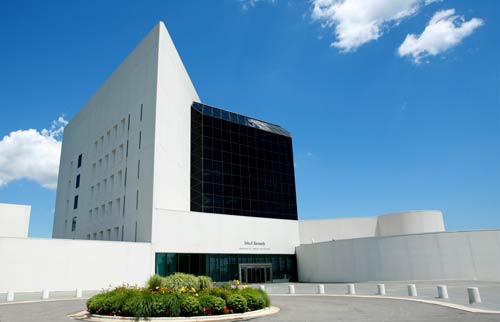Follow our weekly series, Throwback Thursday, designed to help celebrate 50 years of OHA. We’ll profile a year in the life of the organization each week with photos, logos, and highlights taken from the Oral History Association Newsletter. We welcome your memories, photos, and comments at oha@gsu.edu.
OHA in 1979…
JFK Library, dedicated in 1979
OHA President Moss was Chief Archivist at the JFK Library
President: William Warner Moss, John F. Kennedy Library
Site of the Annual Colloquium: East Lansing, MI, Michigan State University
Newsletter: Tom Charlton, editor; L. Katherine Cook, Adelaide S. Darling, Rebecca S. Jiménez, Margaret L. S. Miller, and David B. Stricklin, associate editors
Editorial office: Baylor University, Waco, Texas
Annual individual membership: $10
Highlights of the year from the Oral History Association newsletter:
- An article titled “OH in Health Care Reaching Epidemic Proportions” described how professionals in the health care fields were using oral history to document their recent history, stating that “…projects have sprung up in a variety of medical, mental, and other health-care and life-science fields, inspired in large part by the work of Peter D. Olch and Manfred J. Waserman of the National Library of Medicine’s History of Medicine Division. Both were active members of OHA and were profiled in the Winter 1979 newsletter.
- Historian Arthur Schlesinger, Jr., Albert Schweitzer Professor of Humanities at the City University of New York, was a featured speaker at the 14th National Colloquium held at Michigan State. Schlesinger was a prolific writer of history, a Pulitzer Prize Winner, and served as special assistant to Presidents Kennedy and Johnson.
- OHA members adopted the “Evaluation Guidelines of the Oral History Association” at the 1979 business meeting. The guidelines addressed a wide range of topics such as selection of interviewers and respondents, maintenance of project records, finding aids, legal and ethical questions, and interview content. The guidelines were intended to help those called upon to evaluate oral history programs and projects.
Who we were interviewing in 1979…
- The U.S. Dept of Energy–government employees on the role of the Department in the Three Mile Island nuclear accident.
- The Greater Cleveland Ethnographic Museum–nearly 100 immigrants and migrants who settled in the are between 1896 and 1939.
- Michigan Department of Natural Resources–fishermen on the Great Lakes for a spawning atlas.
- Emory University–people who witnessed the liberation of German-held POW, labor, and death camps as part of the Witness to the Holocaust oral history project.
Check back next week when we reach the 1980s!


